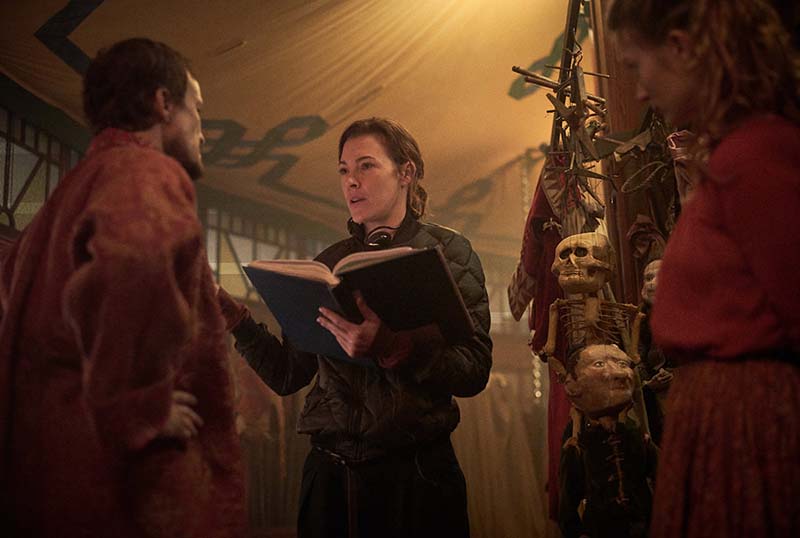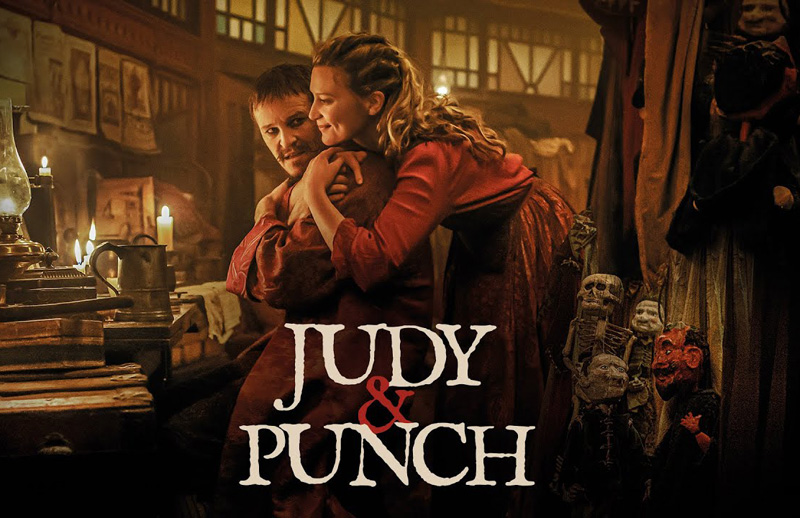ComingSoon.net got the opportunity to chat with writer/director Mirrah Foulkes (War Machine) to discuss her feature-length debut on the dark period dramedy Judy and Punch starring Mia Wasikowska (Crimson Peak) and Damon Herriman (Once Upon a Time in Hollywood). Click here to rent or own Judy and Punch now!
In finding a way to tie some of the themes of its period setting with the retrospective reflection on the issue of domestic abuse and general violence the titular puppets’ raise, Foulkes found the task to be “kind of scary” as all of these elements found their way to the surface once she started scripting the film.
“I think if you’re writing period, you’re always looking for a contemporary parallel or relevance, in this particular world when I was writing in 2017 or ’18, it didn’t feel alarmingly striking to me how many parallels there were,” Foulkes recalled. “It made me kind of contemplate whether we really change much and whether these are just human things that continue throughout generations regardless of what time we’re living in. It wasn’t a matter of kind of going in and searching for those things at all, it was a matter of discovering them and going, ‘Huh, this character is kind of staring to feel a lot like a contemporary politician or dictator I know.’ It was like those things were revealing themselves to me, not the other way around.”
In looking back at how the concept for the story came about, the Australian filmmakers revealed it came from production company VICE, who brought the idea to Foulkes to discuss “what that might look like and what it might be” and after their initial talks they came to an agreement about the path the film should take.
“We were always certain that it had to be something that was reexamining the sort of violence and misogyny that was inherent in the puppet play from a contemporary lens, but at that stage we didn’t talk about it being period so I just went off and did a deep dive into a lot of research and I felt that in creating a sort of fictionalized origin story around this, I was A) able to set it in this time and place that really felt electric and alive and had these contemporary parallels and B) sort of create this fantastical, non-period strict world where we could sort of stand and do whatever we wanted,” Foulkes explained. “I wanted to work backwards and look at this rudimentary, simplistic and violent hand puppet show that’s very popular even today and examine how and why that came to be.”
This working relationship with the Canadian media company is how the decision for Foulkes to make her feature-length debut on the project came about, as she found that with VICE “trusting me with developing this story” the rest of the pieces fell into place and “it sort of happened organically.”
“I started writing it for them and then I got excited about it and they got excited about it and I had other things I was writing at the time that I probably assumed would be my first film, things that were less timely and ambitious,” Foulkes noted. “But this one just sort of kept rolling and suddenly we had it up and financed and it was quite unexpected, in a lot of ways, and I found myself biting off pretty giant mouthfuls that I hadn’t expected for my first film.”
Foulkes laughed when describing how it felt stepping behind the camera for the film, calling it both a “good” and “terrifying” feeling while also believing those feelings can come from any set or project and noting only a minor difference between her work directing short films and a feature-length project.
“In a lot of ways, it was the same as all of the shorts but in a bigger scale, you do your work, you work so hard, I think particularly when you’re a writer/director, you spend so much time in the world,” Foulkes described. “You spend years with your head sort of firmly in this imaginary world so when the time comes to actually realize it, you’re very familiar so you feel like you’re an authority on that world, but I guess what starts to happen is you become aware of the compromises you’re going to have to make. That’s sort of what filmmaking feels like is a long series of compromises to try and fight to get the best version of what’s in your head, at least that’s what it felt like on this.”

Given the ambition and scope of the project, one of the biggest challenges she ran into was simply the shooting locations in Australia, finding it to be a “huge challenge visually” as it was “not where I was expecting to shoot” nor was it “where I hoped to shoot,” but found the resulting experience to be “really great” as she was “surrounded by people I had worked with before and had a very kind of close, tight support system around me.”
“Everything feels like a challenge really when you’re making a movie, it’s so fucking hard,” Foulkes laughed. “But there was a lot of kind of joy amongst it and around it and I look back on it now and I’m just kind of amazed that I got to make this film. Film is in such a strange place, it’s such a delicate time and I think it’s getting harder and harder to get films up, especially something as risky as this movie is, tonally. For a first timer, I was very lucky to have the opportunity to make it and I’m trying to kind of reframe the narrative as less about trauma and more about gratitude, because when I first finished the film, I felt traumatized and thought, ‘I’m never doing that again, it sucked.’ But apparently it’s like childbirth, you get past it relatively quick and want to do it again. [Laughs] I’m not actually a mother so I don’t know if I can use that comparison but I’m using it anyway.”
Though describing the process as “incredibly hard,” given that her homeland doesn’t have “an abundance of 17th century villages,” she found herself lucky when it came to location scouting on the film once she discovered an artist’s colony just outside of Melbourne by the name of Monstalvat.
“It’s a beautiful, kind of fantastical village that was built by a bunch of artists an architects over the course of 20 or 30 years,” Foulkes warmly described. “It was inspired by European architecture from medieval times, so it just felt right and felt of our world and as weird and chaotic as the film felt in my head, so we built everything around that as our central location. But we didn’t have a lot of choice and sometimes not having a lot of choice is maybe okay, it can maybe lead to a resourcefulness that maybe I had a lot more time to focus on other things because it was like, ‘These are the locations I have to shoot in, because there’s nothing else, let’s just get on with making them feel right and making them work.’ I’m sure there’s always a way to find the positive spin, but it was tough, we didn’t have these real and beautiful and traditional locations that I had imagined, we had to work with what we had.”
Despite the smaller-budget nature of the project, Foulkes found the work the production design department did in bringing the story to life to be “pretty amazing” and that unlike some contemporary or “strict period” films, her and her crew were able to take some liberties and she allowed “each head of department to bring their own fantastical, artistic world to it.”
“You’re asking that of anybody on any film to a point, but I think with a film like this, I was really encouraging my crew to think as big and wildly as I did when I was writing the film,” Foulkes recalled. “That can be great, you can be presented with things that you never dreamed of or imagined yourself, but it also can have its challenges, because you’re trying to articulate a world you have no reference for, because it doesn’t exist anywhere else. I think a lot of the time the crew was so used to having a reference, just to be grounded in the same place, but I kept saying to my crew that it shouldn’t feel like anything else, that can be really exciting but can also be a bit daunting. Some people embrace that more than others, it’s really wonderful when you have someone that says, ‘Fuck yeah and what about this and what about that.’ My composer, François Tétaz who scored the film, he absolutely got it and he just went there and went really far and sometimes really far in the wrong direction, but he was so happy to come back and go in another direction. It was that kind of energy that I was looking for in all of my collaborators.”
RELATED: Exclusive Debt Collectors Clip Featuring Scott Adkins
In the anarchic town of Seaside, nowhere near the sea, puppeteers Judy (Wasikowska) and Punch (Herriman) are trying to resurrect their marionette show. The show is a hit due to Judy’s superior puppeteering, but Punch’s driving ambition and penchant for whiskey lead to an inevitable tragedy that Judy must avenge.
In a visceral and dynamic live-action reinterpretation of the famous 16th-century puppet show, writer-director Mirrah Foulkes (Animal Kingdom) turns the traditional story of Punch and Judy on its head and brings to life a fierce, darkly comic and epic female-driven revenge story.
The movie also stars Terry Norris (Mortal Engines), Gillian Jones (Mad Max: Fury Road), Tom Budge (Son of a Gun), Benedict Hardie (Hacksaw Ridge), and Lucy Velik (The Ex-PM).
Judy & Punch is produced by VICE Studios and Blue-Tongue Films. Producers include Michele Bennett, Nash Edgerton of Blue-Tongue Films, and Danny Gabai of VICE Studios. The film is executive produced by Natalie Farrey, Eddy Moretti, Jennifer Semler, Tom Punch, and Lucy Punch.










